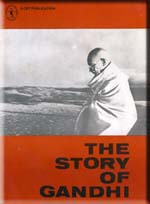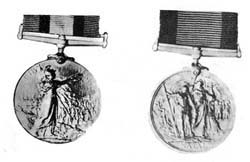
P.O. SEVAGRAM, DIST.WARDHA 442102, MS, INDIA. Phone: 91-7152-284753
FOUNDED BY MAHATMA GANDHI IN 1936
The Story of Gandhi

THE STORY OF GANDHI
Written by : Rajkumari Shanker
Table of Contents
- Birth And Childhood
- Preparation for England
- In England
- Back In India
- In South Africa
- In India
- Back In South Africa
- Indian National Congress
- In South Africa Again
- Assault
- Tolstoy Farm
- Returned To India
- Establishment of Satyagraha Ashram
- Benaras Speech
- Champaran Satyagraha
- Ahmedabad Mill-Workers Satyagraha
- Rowlatt Act
- Jallianwalla Bagh Massacre
- In Prison
- Salt Satyagraha
- Sevagram
- Cabinet Mission Plan
- Quit India
- He Ram!!!
About This Book
Written by : Rajkumari Shanker
First Edition :1969
I.S.B.N :81-7011-064-5
Published by :Children's Book Trust,
Nehru House, 4
Bahadur Shah Zafar Marg,
New Delhi 110 002,
India.
© CBT, 1969
Download
Chapter-9 : In South Africa Again
Gandhi kept his promise. He reached natal in time to lead the Indian deputation, but the Colonial Secretary gave the deputation a cold reception. The Indians felt disheartened. From Natal, Mr. Chamberlain proceeded to the Transvaal. The Indians there also wanted Gandhi to present their grievances to him.
Before the Boer war, Indians had been free to enter Transvaal at any time, but now they had to obtain a permit from the newly created Asiatic Department. The new rule was designed to separate Indians from the whites. To get a permit was no easy matter.
The officers of the Asiatic Department did their best to prevent Gandhi from entering the Transvaal but he had his way in the end. He got a permit and went to Pretoria. He was not allowed, however, to lead a deputation and present the memorandum he had drafted. Gandhi now decided to stay in the Transvaal and fight the colour bar which was taking such ugly shape there. He realized that now he would not be able to leave the country, as he had hoped to do. He there fore settled down and prepared to do his utmost for the cause of the coloured people, particularly his countrymen.
He was enrolled in the Supreme Court at Johannesburg. He rented a place and established his office. He made good earnings from his practice, but his heart was his office. He made good earnings from his practice, but his heart was in the service of the people.
Meanwhile, he continued his experiments with vegetarianism. He gave up all luxuries and pleasure pleasures. His idea was to tune his physical body to his spiritual self.
It was at this time that a friend, Madanjit, came to Gandhi with a proposal to start a journal called Indian Opinion. Gandhi liked the idea and in 1904 the journal was launched. Mansukhlal Naazar was the editor. Gandhi helped the journal generously, contributing money from his own earnings. He also organized the work and wrote the editorial column.
The journal published every week in Gujarati and English, reflected his ideals and gave the Indians readers a liberal education. With absolute frankness Gandhi pointed out to them their failings and prejudices. Indian Opinion also gave the Europeans a correct picture of the difficulties faced by the Indians in South Africa.
After the rains in 1904 there was a sudden outbreak of plague in one of the gold mining areas near Johannesburg. It soon spread to the Indian quarters. Gandhi rushed to the spot and organized preventive measures. With the help of friends, he set up improvised hospitals and looked after the sick.
Another thing that happened that year was that Gandhi met H.S.L. polka, then a sub-editor of The Critic. The two soon became fast friend as there outlook on life was similar.
Polak presented to Gandhi a copy of a book by John Ruskin called Unto This Last. This book on economics presented many new ideas, and it influenced Gandhi a great deal. He then hit upon the idea of starting a farm and founding a community with a true sense of brotherhood. His friends supported the project enthusiastically.
About a hundred acres of land were acquired at a place called Phoenix near Durban, and a farm was set up. In the beginning six families were settled there. Indian Opinion was moved to Phoenix, complete with press and office. Members of any race could freely go and live there, cultivating the soil or working at the press.
Gandhi, however, could stay in the Phoenix settlement only for brief periods. His headquarters were at Johannesburg where he continued his practice as lawyer. He knew that it would not be possible to return to India in the near future, so he decided to send for Kasturbai and the children. They soon joined him.
Whenever he found time he undertook the task of educating his three sons. He also pursued the experiments with his diet. 'I intend to be the ruler of my body,' he would say, 'the spirit can only rule me if I free of earthly wants.'
'Coffee and tea were given up. Milk went next. Some times he would fast, taking only water. kasturbai watched all this silently. She knew it was useless to argue with her husband on such matters.
In 1906, the Zulu 'Rebellion' broke out in Natal. It was a no-tax campaign. The Zulus were only asserting their rights, but the whites got panicky and declared war against the Zulus.
Gandhi's sympathies were with the Zulus, but they were fighting against the British and Gandhi believed that the British Empire existed for the welfare of the world. He considered it his duty to help the British. He offered to form an Indian Ambulance Corps. The authorities accepted the offer.
The Indian Ambulance Corps was formed. It consisted of a squad of twenty-four men, and was in active service for six weeks, nursing and looking after the wounded.
Gandhi realized that the whites were determined to enforce the tax on the unwilling Zulus. They wanted to put down all resistance and deny the coloured people their rights in their own land.
The Zulu 'Rebellion' was finally over and Gandhi returned to Johannesburg. His presence was needed there to look after of oppression from the white settlers.

Figure 2: Medals awarded to Gandhi for his services during two wars in South Africa